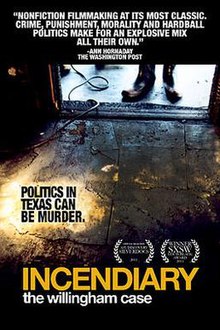Incendiary: The Willingham Case
| Incendiary: The Willingham Case | |
|---|---|

Theatrical Release Poster
|
|
| Directed by |
|
| Produced by |
|
| Starring |
|
| Music by | Graham Reynolds |
| Cinematography |
|
| Edited by | Steve Mims |
|
Production
company |
YOKEL
|
| Distributed by | Truly Indie |
|
Release date
|
|
|
Running time
|
102 minutes |
| Country | United States |
| Language | English |
Incendiary: The Willingham Case is a 2011 documentary film by Steve Mims and Joe Bailey, Jr. that explores the conviction and execution of Cameron Todd Willingham for arson murder. Equal parts murder mystery, forensic investigation and political drama, the film meticulously reviews the arson evidence used to convict Willingham, and immerses audiences in contemporary struggles over the case.
Incendiary won the Louis Black Special Jury Award in its debut at the 2011 South By Southwest (SXSW) Film Festival. It also screened in the Sterling US Feature Competition at the 2011 American Film Institute / Discovery Channel Silverdocs Festival. It was released in United States cinemas in fall 2011 to good reviews, in iTunes Movies in 2012, and continues to screen in U.S. theaters via Tugg.
The film mixes stylized recreations of fire science with cinema verité coverage of efforts to review Willingham’s case—by the Texas Forensic Science Commission and within the Texas court system. It also features in-depth conversations with Willingham defense counsel David Martin, who maintains his client’s guilt vociferously. A press conference with Willingham’s ex-wife Stacy Kuykendall on the courthouse steps of a Court of Inquiry hearing into the case is also captured, cut against the court’s review of the evidence against Willingham.
Amid the struggles in the courts and political sphere over the Willingham case, consensus mounts in the scientific community that there is no valid evidence of arson to meet any standard for criminal indictment of Willingham, who was imprisoned for twelve years, and executed for the fire deaths of his three young daughters. The film juxtaposes this scientific consensus with impassioned statements from Willingham’s outspoken detractors, most notably defense counsel David Martin, Governor Perry and Perry's new appointee to the Forensic Science Commission, Chairman John Bradley. The film's subjects also contemplate the case's implications for the American system of justice, and the use of forensic science in the courtroom.
The film also depicts political rancor over the case. Texas Governor Rick Perry, who denied a stay of execution for Willingham in 2004, characterizes Willingham as a “monster,” and suddenly removes members of the Forensic Science Commission two days before they were scheduled to hear testimony on the Willingham arson evidence. Gov. Perry appoints political ally John Bradley as the commission’s new chair, who delays and attempts to minimize public discussions of the case. Rick Perry wins the Republican nomination, and reelection as Texas Governor, two weeks after the Texas Third Court of Appeals halts a District Court Judge’s Court of Inquiry into the Willingham case. The Texas Senate ultimately refuses to confirm John Bradley as Texas Forensic Science Commission Chair, but Bradley’s appeal to Texas Attorney General Greg Abbott to limit the jurisdiction of the Texas Forensic Science Commission is granted after Bradley’s position expires, in July 2011. Attorney General Abbott, whom Perry appointed in 2002, advises the commission that it has no jurisdiction to look into the physical evidence of the Willingham case, and that exceeding jurisdiction would subject commissioners to individual civil liability. (Though the timing remains unmentioned in the film, the opinion is delivered two weeks before Gov. Perry announces his candidacy for President of the United States, and five years after the Forensic Science Commission initially accepted the Willingham/Willis complaint. Also the Attorney General’s office had a representative attending every Forensic Science Commission meeting from its inception, and never previously questioned the body’s jurisdiction; Assistant AG Barbara Deane can be seen in meetings documented in the film.) The film looks upon the anti-death penalty movement’s seizing upon the case with some skepticism: the primary voices of the film emphasize scientific standards and due process; however they also acknowledge Supreme Court Justice Antonin Scalia’s invitation to anti-death penalty groups looking for a case to seize upon: “If such an event had occurred in recent years, we would not have to hunt for it; the innocent’s name would be shouted from the rooftops.”
...
Wikipedia
